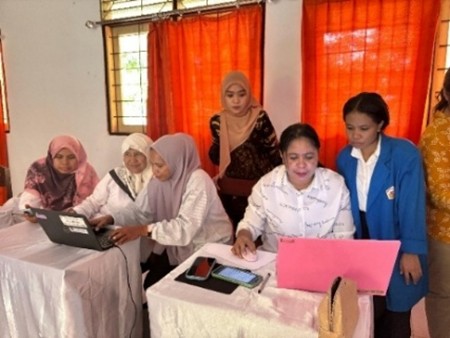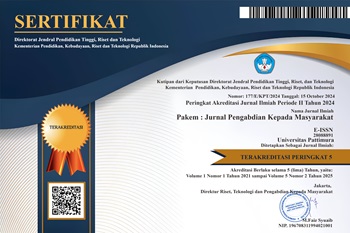UPAYA MENINGKATKAN KOMPETENSI DIGITAL GURU MELALUI PELATIHAN PENGGUNAAN LEARNING MANAGEMENT SYSTEM BERBASIS EDUKATI
Abstract
The development of digital technology has brought significant changes in education, including in the learning process. However, teachers in remote areas such as Leihitu Barat District, Central Maluku, still face limitations in digital competence and infrastructure, which hinder the optimal use of educational technology. Based on these conditions, this community service program was carried out with the aim of improving teachers’ digital competence through training on the use of the Edukati-based Learning Management System (LMS). The activities involved several stages, including preparation, face-to-face training, hands-on practice using the LMS, online mentoring after the training, and evaluation through pre-test and post-test. The results indicated a significant improvement in participants’ understanding and skills. Before the training, all teachers had no knowledge of LMS and no prior experience in using it. After the training, all participants understood the basic functions of LMS, and 75% were able to operate Edukati’s key features, such as creating digital classes, uploading materials, and designing learning assessments. Teachers’ readiness level increased from 4.2% (not ready) to 82.1% (ready). Nevertheless, limited devices, unstable internet access, and the absence of technical staff remain challenges in implementation. Teachers’ enthusiasm, the support of a WhatsApp community, and the openness of partner schools to digital innovation provide opportunities for program sustainability. Therefore, the Edukati LMS training proved effective in improving teachers’ digital literacy and is essential as a strategic step to strengthen digital culture in education, particularly in remote areas
Downloads
References
Ally, M. (2019). Competency Profile of the Digital and Online Teacher in Future Education. The International Review of Research in Open and Distributed Learning, 20(2). https://doi.org/10.19173/irrodl.v20i2.4206
Ardi Nugraha, C., Kuswandi, D., & Praherdhiono, H. (2022). Teacher Professional Development to Train Digital Skills with Technological Pedagogical Content Knowledge (TPACK). JTP - Jurnal Teknologi Pendidikan, 24(3), 330–340. https://doi.org/10.21009/jtp.v24i3.31019
Drijvers, P., Kieran, C., Mariotti, M.-A., Ainley, J., Andresen, M., Chan, Y. C., Dana-Picard, T., Gueudet, G., Kidron, I., Leung, A., & Meagher, M. (2009). Integrating Technology into Mathematics Education: Theoretical Perspectives. In C. Hoyles & J.-B. Lagrange (Eds.), Mathematics Education and Technology-Rethinking the Terrain (Vol. 13, pp. 89–132). Springer US. https://doi.org/10.1007/978-1-4419-0146-0_7
Fitrah, M., Setiawan, C., Widihastuti, W., Sofroniou, A., Azizatur Rahmawati, N., Arina, A., Ratna Sari, S., & Iskandar, I. (2025). Impact of Learning Management Systems and Digital Skills on TPACK Development Among Pre-service Mathematics Teachers. Qubahan Academic Journal, 5(1), 504–518. https://doi.org/10.48161/qaj.v5n1a1392
Fitriyani, F., & Nugroho, A. T. (2022). Literasi Digital Di Era Pembelajaran Abad 21. Literasi Jurnal Pengabdian Masyarakat dan Inovasi, 2(1), 307–314. https://doi.org/10.58466/literasi.v2i1.1416
Khairunnisa. (2025). (PDF) Penggunaan Platform Merdeka Mengajar oleh Guru Mata Pelajaran Sejarah di SMA Negeri 10 Banjarmasin. ResearchGate. https://doi.org/10.24269/dpp.v12i2.9254
Mananggel, M. B., Moma, L., & Laamena, C. M. (2021). Pemanfaatan TIK Sebagai Media Pembelajaran Bagi Guru SMA Di Kecamatan Kairatu Kabupaten Seram Bagian Barat. PAKEM : Jurnal Pengabdian Kepada Masyarakat, 1(1), 20–28. https://doi.org/10.30598/pakem.1.1.20-28
Purwadi, R. E., Chadijah, S., & Suhana, A. (2024). Analysis Of Teacher Competence In Using Digital Learning Media. Jurnal Ilmiah Edukatif, 10(2), 237–247. https://doi.org/10.37567/jie.v10i2.3315
Qinglin, H., & Abidin, N. B. H. Z. (2024). Impact of Digital Literacy on LMS Utilization in Higher Education Institutions in Jiangxi, China. International Journal of Academic Research in Business and Social Sciences, 14(11), 1601–1608. https://hrmars.com/index.php/IJAREMS/article/view/23693/Impact-of-Digital-Literacy-on-LMS-Utilization-in-Higher-Education-Institutions-in-Jiangxi-China?utm_source=chatgpt.com
Redecker, C., & Punie, Y. (2017). European framework for the digital competence of educators: DigCompEdu. Publications Office of the European Union. https://data.europa.eu/doi/10.2760/159770
Stefani, A., & Vassiliadis, B. (2023). A Certification Framework for E-Commerce Digital Competencies. https://www.scirp.org/journal/paperinformation?paperid=125221
Stefany, S., & Helmi, J. (2024). Digital literacy and online course design: Study of Indonesian educators. Jurnal Cakrawala Pendidikan, 43(3), 723–736. https://doi.org/10.21831/cp.v43i3.71403
Tandirerung, V. A., & Mangesa, R. T. (2023). Pengembangan E-learning Berbasis Edukati Pada Sekolah Menengah Atas. Information Technology Education Journal, 46–49. https://doi.org/10.59562/intec.v1i3.252
Wahyu Aji, A. A. (2025). Tantangan Globalisasi Teknologi Terhadap Guru di Daerah Terpencil; Sebuah Tinjuan Kritis. https://doi.org/10.5281/ZENODO.15710377
Yulita, I. N., & Rizka, Y. (2021). Pemberdayaan Guru Melalui Pelatihan Media Pembelajaran Jarak Jauh Di Masa Pandemi. Kumawula: Jurnal Pengabdian Kepada Masyarakat, 4(3), 494–499. https://doi.org/10.24198/kumawula.v4i3.34451

Copyright (c) 2025 PAKEM : Jurnal Pengabdian Kepada Masyarakat

This work is licensed under a Creative Commons Attribution-NonCommercial-ShareAlike 4.0 International License.
Authors who publish with PAKEM: Jurnal Pengabdian Kepada Masyarakat agree to the following terms:
- Authors grant copyright to the journal and right of first publication with the work simultaneously licensed under a Creative Commons Attribution License (CC BY-NC-SA 4.0)
- Authors are able to enter into separate, additional contractual arrangements for the non-exclusive distribution of the journal's published version of the work (e.g., post it to an institutional repository or publish it in a book), with an acknowledgment of its initial publication in this journal.
- Authors are permitted and encouraged to post their work online (e.g., in institutional repositories or on their website) prior to and during the submission process, as it can lead to productive exchanges, as well as earlier and greater citation of published work.

1.png)













